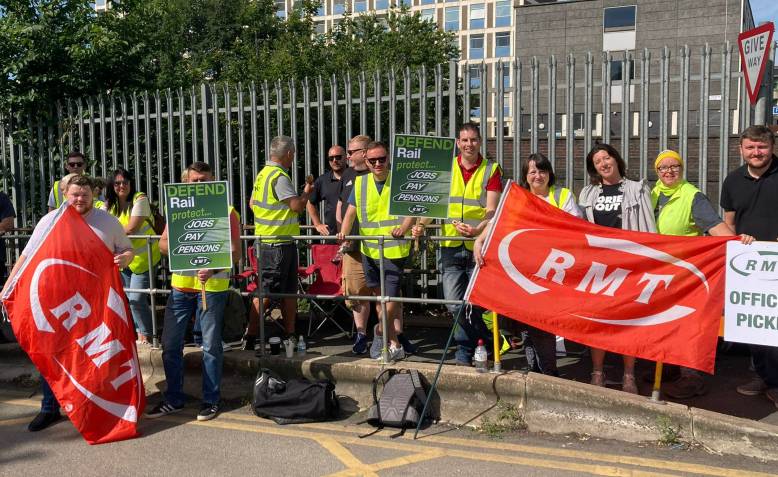 RMT picket line, Crewe. Photo: Sam Colclough
RMT picket line, Crewe. Photo: Sam Colclough
Lindsey German on the rail strikes, the Tory crisis and class politics
1It has been a real success so far, with very little moving on the rails, strong support from the public, and the RMT members solid in their action. The union’s leadership, especially Mick Lynch, have been exemplary in rebutting government/employer/media arguments against the strike, showing real confidence and determination.
2The strike has brought class questions to the fore, as major strikes always do. ‘Which side are you on’ is the question of the hour, and millions of workers are on the side of the rail workers. On the other hand, the whole of the ruling class and its hangers on are bitterly opposed to the strike. The BBC is in full ‘national crisis’ mode, Tory MPs try to frighten people by constantly referring to the 1970s, none of them talk about company profits or shareholder payouts – it’s all about the country can’t afford it.
3The Tories are making two major mistakes here: the generalised attack of the ‘cost of living crisis’ means everyone wants a sizeable pay rise – to deny this for all public sector workers is simply not going to be tenable. The other mistake is to treat working class people as stupid, misled by ‘union militants’.
4They genuinely believe a return to the 70s would be a disaster – and it would be for their class. But for those who want decent pay and conditions, housing they can afford, the ability to visit a GP or call an ambulance if ill, the 70s maybe don’t look too bad.
5This Tory government has all the class hatred of Thatcher and co, but lacks much else. It is weak corrupt and incompetent and really has no idea how to handle a major industrial dispute when there is a group of organised workers fighting for a pay rise linked to inflation (how revolutionary!) and when both inflation itself and the tight labour market means the cards aren’t all in the bosses’ hands.
6The whining of spoilt media personalities reflects a similar phenomenon – workers are supposed to be isolated and deferential. The shock when they are not is real and reflects decades of the ruling class getting far too much their own way.
7The mood has changed among the left since the TUC demo and these strikes. There is more confidence and a determination among other groups of workers to follow suit.
8These central class questions require a high degree of unity on the left in support of these and wider demands, especially in relation to the cost of living, but also to the nature of work and the need for higher wages, better conditions and shorter hours. Solidarity with the strikes will spill over into organising round many of these demands.
9As Rosa Luxemburg pointed out, strikes have within them the seeds of much greater struggles, for the socialist transformation of society. The point to a different, collective way of organising work and life in general, and show working class people their own power which is hidden from them in capitalist society.
10That’s why victory for the strikes is crucial and we should all be doing everything we can to win. We can learn much from the big strikes of the 70s, but the working class in Britain is once again writing its own history”.
Join Revolution! May Day weekender in London
The world is changing fast. From tariffs and trade wars to the continuing genocide in Gaza to Starmer’s austerity 2.0.
Revolution! on Saturday 3 – Sunday 4 May brings together leading activists and authors to discuss the key questions of the moment and chart a strategy for the left.

